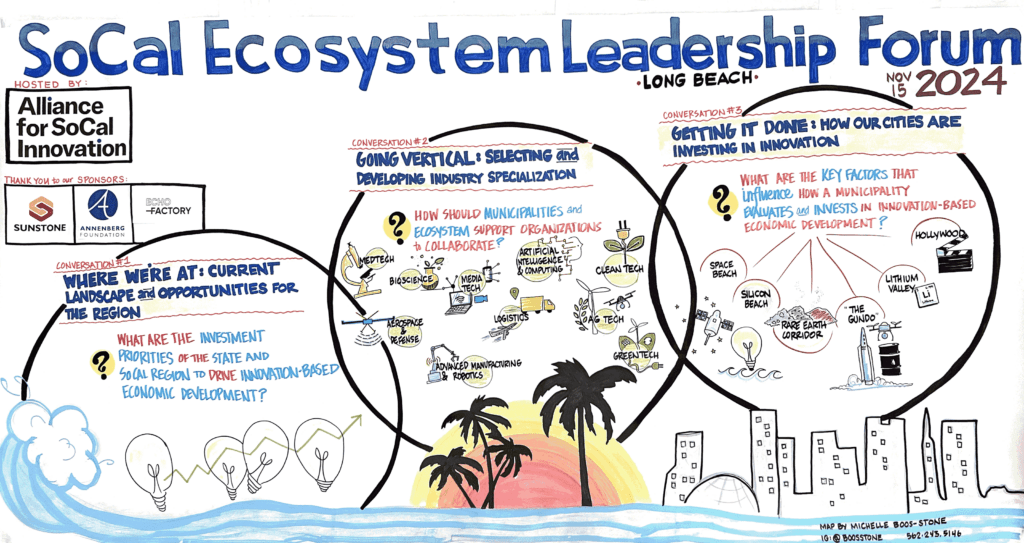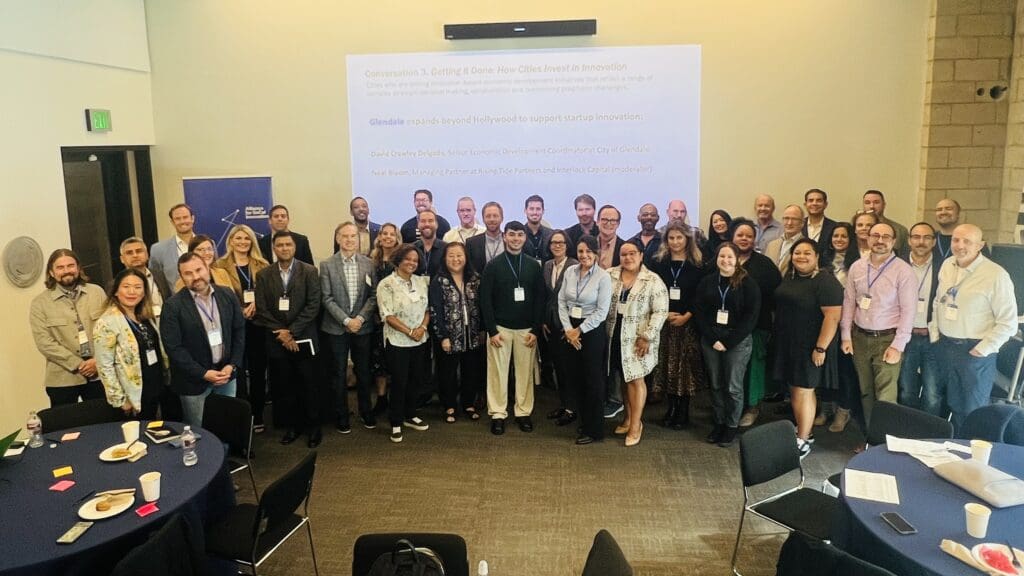SoCal Leaders Converge for Innovation-Based Economic Development Workshop

The sixth annual SoCal Ecosystem Leadership Forum on November 15th in Long Beach was uniquely effective this year due to its focus on innovation-based economic development and our ability to assemble the right mix of key economic development leaders willing to have candid discussions and share thoughtful insights. This year’s half-day workshop, sponsored by Sunstone Management, Annenberg Tech and Echo Factory, explored developing industry cluster concentration (e.g. “verticals” like biotech, aerospace & defense, cleantech) within a geographic region to drive sustainable economic growth that matches the communities’ capabilities and strengths. It’s easy to say you want “tech” jobs in your city or be the next “silicon ____” but this workshop showcased and supported the harder task of being both pragmatic and forward thinking in developing a strategic plan that is effective at driving long lasting growth. Furthermore, it underlined the necessity of forging collaborative partnerships between government and industry-based organizations to ensure these pro-growth initiatives produce the target outcomes for the entire community.

After an informative and well received presentation from Chris Earl on funding opportunities and investment priorities for Go-BIZ CalOSBA programs, we were treated to an engaging presentation and discussion with Jennifer Hiramoto. Formerly at the City of Glendale and now the Executive Director for the City of Ontario’s EDA as well as the Chair at the California Association of Local Economic Development, Jennifer possesses a broad perspective on economic development throughout the region. Using Glendale as an example of a city council-driven initiative designed in 2016 to bring in more tech startups and create a diversified tech hub that didn’t previously exist, she emphasized the importance of developing (and sticking to) a long term strategic plan that requires patience and includes voices from industry and the community stakeholders in the design and implementation of the plan. From our own recent experience participating in Glendale’s startup attraction and retention strategy (we provided input years ago and were recently part of a group awarded a grant to support startup growth), I can say that they have done well by bringing in partners with proven track records of successful strategy articulation and implementation (e.g. run an accelerator). Later in the day we heard from David Crawley Delgado who currently runs the tech-based innovation programs for the City of Glendale who further emphasized the need for city governments to get out of their own way and embrace consultants and partners with ties to the community who can help implement the roadmap.
The City of Ontario is planning and implementing a very different innovation strategy than Glendale. They are more focused on capitalizing on their existing strengths to attract high-paying jobs and families to the Inland Empire such as a high concentration of warehouses and transportation centers (e.g. Amazon’s largest warehouse in the US with 4.5 million square feet) to lay the groundwork for potential innovation-based jobs in logistics and robotics – think of all the robots that will need to be tested and repaired in those warehouses and specialized EVs to transport the goods. They are currently engaging consultants to drive the next phase of the innovation plan while focusing their energies on building the infrastructure to keep up with current demand.
We’re fortunate to have so many strong industry-specific ecosystem support organizations in SoCal who partner with governments in the region and beyond. For the forum we chose to focus on our regional strongholds in cleantech, life science, and aerospace & defense anchored by strong SoCal-based support organizations who each work with governments and industry to promote and strengthen innovation in the region and beyond. AltaSea is a blue tech innovation hub located at the Port of LA that runs a variety of programs to accelerate scientific projects and startups. Their very existence required a ton of collaboration with the Port and other government agencies who each have a different oversight role at the port but navigating those is essential to getting the important scientific innovation accomplished. For life science organizations, we have a number of organizations that provide differentiated support services like Biocom who, among other things, shapes government policy through advocacy while the Larta Institute supports entrepreneurs through publicly funded programs such as the SBA’s SBIR/STTR program. BioscienceLA is an initiative created by and partially funded by Los Angeles County to provide coordination and awareness for local biotech innovation. For a region this size, it is necessary to have a network of strong ecosystem support organizations that can work independently on specific parts of innovation support (implement gov’t funded programs, lobbying/advocacy, coordination and promotion, etc) who also have compelling motivations to collaborate with each other.
Our region is the leading Aerospace & Defense innovation hub due in large part to the cities of El Segundo and Long Beach who work in a symbiotic yet competitive relationship. Both are anchored by major airports which has helped them build on legacy infrastructure and the presence of ‘primes’ (large corporate anchors like Boeing, Northrop Grumman, Raytheon, etc) as well as government agencies like Spacewerx (especially their accelerator DTI) and the U.S. Air Force. El Segundo Mayor Pro Tem Chris Pimentel spoke about how his city makes great use of their limited real estate to support successful startups but when it comes to scaling up larger manufacturing facilities, growth stage startups often look to Long Beach just a short drive away. To keep the region’s leadership position, both of the local municipalities are very involved in helping ensure the innovators are not stifled by unnecessary regulation or bureaucracy, like expediting electrical power upgrades to support expansion and modifying pre-existing zoning regulations. Long Beach’s Deputy Mayor of Economic Development Lucius Martin also emphasized the importance of being responsive and available to the business community while also having a strong vision and plan to ensure that Space Beach is not just a slogan.
Our panel discussion with leaders from Pasadena such as Councilperson Felicia Williams, Patrick Church from JLL, and Mike Shaffer from Echo Factory highlighted a different scenario where the city wanted to be more business friendly in response to a growing demand for life science and deep tech startups to locate there but lacked the zoning and infrastructure to support it. One of the surprising facts shared at the forum is that most companies are located in Pasadena because the founder lives there, which was one of the motivating factors for expanding life science-friendly policies for a CEO who wanted to build a headquarters for his recently funded biotech company in Pasadena but had no available place for it. The hard work by the city council and economic development team enabled that transformation which has ushered in many other companies into the city which now has enough critical mass to be considered an innovation hub in those new areas to further attract more talent, companies and investment.
Each of these cities started their innovation agendas from different points of industry maturity and with different ingredients but the common hallmark of success is their willingness to collaborate with industry leaders and ecosystem support organizations to provide the insights and ‘voice of the customer’ input while balancing the various needs of the community stakeholders and the broader political landscape. Knowing when to lead and when to get out of the way is a crucial skill of these cities, who don’t always get it right every time, but their overall success shows how they’ve learned and adapted to the circumstances and developed relationships that have served them well in building economic opportunity and prosperity for their communities.
In the coming weeks we’ll publish a more comprehensive report on the findings and lessons learned from the forum but for now it’s time to finish preparations for Thanksgiving, so stay tuned!